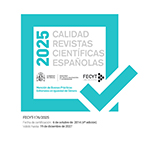La inteligencia emocional como predictora del rendimiento académico en la infancia: el contexto pluricultural de Ceuta
Resumen
Este trabajo tiene como objetivo conocer los predictores de la Inteligencia Emocional (IE) y el Rendimiento Académico (RA) de alumnos, de 6 a 12 años, en la ciudad de Ceuta. Se contó con una muestra de 404 participantes, procedentes de 4 centros distintos, que reflejan las características del contexto pluricultural de la ciudad; el 47.8% son niños y el 52.2% niñas, el 68.8% de cultura/religión musulmana y el 31.2% cristiana. Como instrumento de evaluación se ha empleado una adaptación propia del MSCEIT (Test de Inteligencia Emocional de Mayer, Salovey y Caruso, 2009) y las calificaciones de los alumnos. Se encontraron niveles medio-altos en ambas variables. Los predictores de la IE son la Edad y el Rendimiento. Estatus y Cultura aparecen como predictores, pero no en todos los casos. Los predictores del Rendimiento son la IE, la Cultura y la Edad. El Estatus aparece en dos factores. Se encontró relación estadísticamente significativa entre IE y RA, siendo mayor a medida que ascienden las puntuaciones en IE.
Descargas
Licencia
La Revista Complutense de Educación, para fomentar el intercambio global del conocimiento, facilita el acceso sin restricciones a sus contenidos desde el momento de su publicación en la presente edición electrónica, y por eso es una revista de acceso abierto. Los originales publicados en esta revista son propiedad de la Universidad Complutense de Madrid y es obligatorio citar su procedencia en cualquier reproducción total o parcial. Todos los contenidos se distribuyen bajo una licencia de uso y distribución Creative Commons Reconocimiento 4.0 (CC BY 4.0). Esta circunstancia ha de hacerse constar expresamente de esta forma cuando sea necesario. Puede consultar la versión informativa y el texto legal de la licencia.











